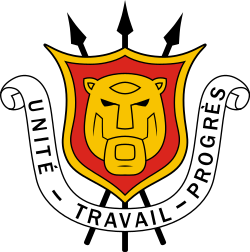This article has multiple issues. Please help improve it or discuss these issues on the talk page . (Learn how and when to remove these messages)
|
Parliamentary Monarchist Party Parti monarchiste parlementaire | |
|---|---|
| Founder | Guillaume Ruzoviyo |
| Founded | August 2001 |
| Ideology | Monarchism Parliamentarism |
| International affiliation | International Monarchist Conference |
 |
|---|
The Parliamentary Monarchist Party (PMP) (French : Parti monarchiste parlementaire) is a small royalist party in Burundi which seeks the restoration of the monarchy, deposed in a coup in 1966. It was founded by Guillaume Ruzoviyo in August 2001. [1] The party has no elected representatives in parliament and Guillaume Ruzoviyo has not held a government post since the end of 2005, but the PMP rallied in a coalition of 10 parties at the 2010 general elections, and obtained the management of the Burundi Embassy in Russia. PMP is member of International Monarchist Conference.